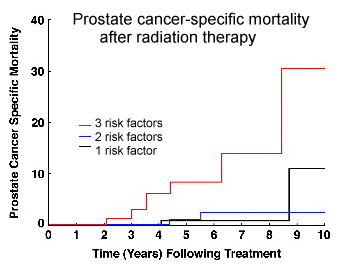| Cancer-specific
mortality after radiation therapy with short-course hormonal therapy
or radical prostatectomy in men with localized, intermediate-risk to
high-risk prostate cancer. Tsai. Cancer 2006;107:2957 |
|
 |
| The presence of
multiple determinants of aggressive cancer
biology may impact prostate cancer-specific
mortality (PCSM) rates compared with fewer
factors. The authors estimated PCSM after
radiation therapy with short-course androgen
suppression therapy (RT+AST) or radical
prostatectomy (RP) in men with clinically
localized, intermediate-risk to high-risk
prostate cancer. |
METHODS. |
| The study cohort
included 3240 men treated from 1981 to 2002 with
RT with 6 months of AST (n = 550) or RP (n =
2690) for localized prostate cancer with at
least 1 risk factor (prostate-specific antigen [PSA]
>10 ng/mL, biopsy Gleason score 7-10, or
clinical tumor category T2b or T2c). Competing
risks regression analyses were used to determine
whether the number of risk factors present was
associated with time to PCSM. |
|
|
Men with all 3 risk factors had
significantly shorter time to PCSM after RT+AST or RP when
compared with men with any 1 or 2 risk factors. The 7-year estimates
of PCSM for men having 1, 2, or 3 risk factors were 0.83%, 2.6%, and
12.6%, respectively.
|
| Men with multiple determinants of
intermediate-risk to high-risk prostate cancer have significantly
increased estimates of PCSM despite aggressive therapy compared with
men with only 1 or 2 determinants. These men are appropriate
candidates for enrollment onto randomized controlled trials
evaluating the benefit of adding systemic therapies such as
docetaxel to RT+AST or RP. |
| |
